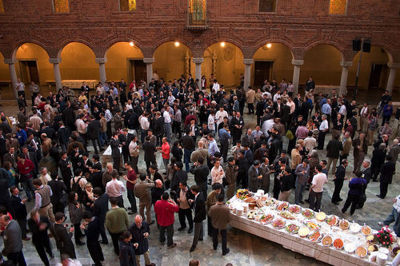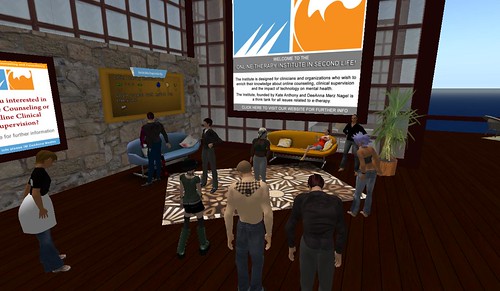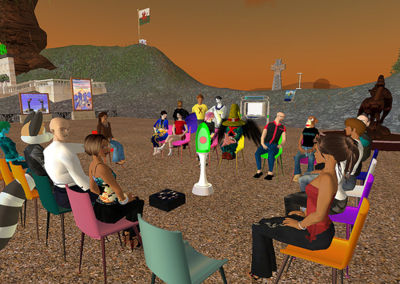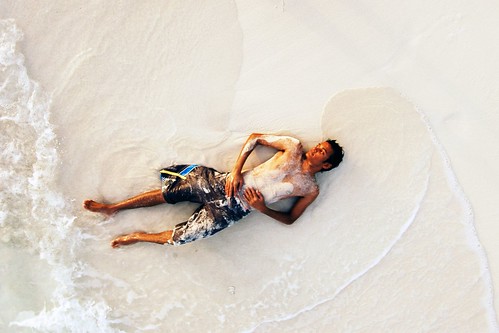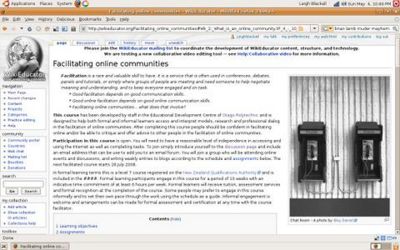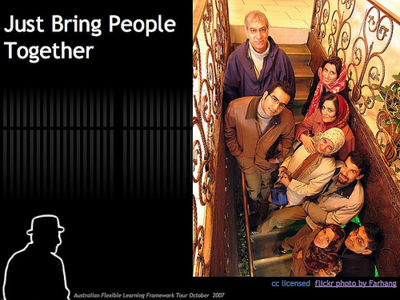 Facilitating Online Communities has come to an end for the year.
Facilitating Online Communities has come to an end for the year. When the course started in July, we had a flattering 84 expressions of interest for participation from a wide range of countries:
- Solomon Islands
- Philippines
- Spain
- Switzerland
- Argentina
- Poland
- Israel
- Portugal
- Norway
- Nigeria
- Brazil
- Australia
- United States of America
- India
- Pakistan
- Canada
- United Kingdom
- New Zealand
- Mauritius
As expected, a little over 15% of those initial expressions of interest saw the course through to the end. In some ways I found the open course was a little like busking. A crowd attracted a crowd, most people were passers by who were willing to show support for the effort. Very few stayed around for the full show, and understandably fewer were interested in paying a fee for formal services such as personal support, assessment and certified recognition. I’m now rethinking the financial model for the course, and am interested to see if I can work out a way to make it entirely free.
In the end we had around 6 formally enrolled people complete the course and receive certified recognition for their efforts, and we had at least 9 informal participants complete the course and who could receive certified recognition in the future should they ever be in a position to pay a fee for the assessment, and should they ever consider it to be beneficial to them. A certificate of participation is on offer to those people, and so far one person from Pakistan has nominated themselves to receive that. The certificate of participation will be helpful to them should they opt for formal certification in the future as it will show the assessors in the future that they completed the course. If I can work out a way to offer the course for free, non of this administration and assessment process need be such a concern.
Since the 2008 course has finished, we have had 2 expressions of interest from the USA for formal participation in the 2009 course. As the 2009 course will not start until July, these 2 people will start the course self directed, and take advantage of the socially constructed learning interactions come July. It may well turn out that they will complete before July, that being the case they will simply require assessment and certified recognition for their completed efforts.
In the future, I hope to negotiate partnership with other institutions where if people from countries other than New Zealand participate in the course, they will be able to obtain formal certification from the partnering Institution in their own country. It could be that a new financial model exists in partnering institutions being able to offer our course in their advertised services…
As the facilitator of the course, I spent 110 hours over the 17 week course and the 5 weeks preparation - total being 110 hours over 22 weeks, averaging out to be 5 hours a week. This is an estimate and the exact number of hours will be known in mid January. At least one participant felt that my time with the course was too little. I feel that 17 weeks is too long for the course, and too many topics were put into that length of time. I also think that it could be possible for my facilitation time to be made less time each week, without adversely affecting the progress and support levels for participants. At least I think I should test it.
The combination of length of time, pace of the course and intensity of communication at various points, were key factors contributing to drop off in participation and increase in facilitation workload. I think it will be possible to reduce the number of topics without compromising the quality of the course, and minimise inefficiencies through smarter design of activities and combination of topics.
For example, the start of the course was a hellish workload for everyone as the first couple of weeks relied on the use of an email forum to coordinate and communicate. The initial number of interested people overwhelmed the email forum with technical preparations and introductions, as well as repetitive questions and some off topic or inappropriate suggestions (innappropriate considering the wide range of experience levels among the participants). Next time I will design a buffer period at the start of the course so as to absorb most of this initial flurry and spread it in a way that creates less noise and stress to people entirely new to the technology. Rather than centralising communications in an email forum at the start, my thoughts are to decentralise and make it appear as though its a very quiet and individual start, but slowly bring it together through activities over the following weeks (and eventually to an email forum if required). This could more successfully demonstrate the idea of networked communications. This approach should allow people to focus on tasks as they attempt to master fundamental tools like their blogs. This buffer period would need to involve unique and interesting activities so that technically experienced people are presented with an engaging enough start that will occupy their enthusiasm in a more helpful and constructive way for the people with less experience. I’m considering the use of Youtube for initial introductions from everyone in video forum mode… as suggested by Craig Hansen. Using Youtube in this way is commonly perceived as a technically difficult task, but is in fact a simple process - probably resulting in a confidence boost for many participants.
A successful activity in the course was the course miniconference. The measure of success is not in terms of numbers of participants, but in the clarity of learning outcomes evident in the blog posts of those who took part in it, such as Elaine. This activity seemed to greatly benefit a number of people’s understanding of key theoretical points discussed in the course. Without this activity, we are sure that such understanding would not have developed. Kay Lewis suggested that a dummy run of the online conference earlier in the course would have helped develop understanding sooner and thus given her the opportunity for deeper learning once the proper mini conference took place. I’m still thinking about how to work two conference activities into the course without loosing other important topics, but and tending to think that given the overview nature of the course, I’m not sure if anything beyond an ah-ha moment is needed… hopefully that moment would be enough to motivate the participants to go out and seek their own opportunities and test new ideas for themselves once the course is over.
Over all the course was a success both in terms of learning outcomes for participants, feedback obtained so far, and my own learning while developing and testing this new models and the techniques needed to facilitate it. There is still some work needed to be done with the administrators of the course to make sure they understand how it is run (very differently to the Blackboard they are used to), what they need to do to support the course, and discussion on how we can accomodate the internationalisation better. Thankfully they have been quite open to the developments so far.
Thanks to all those people who took part and helped carry FOC08 through to the end.




